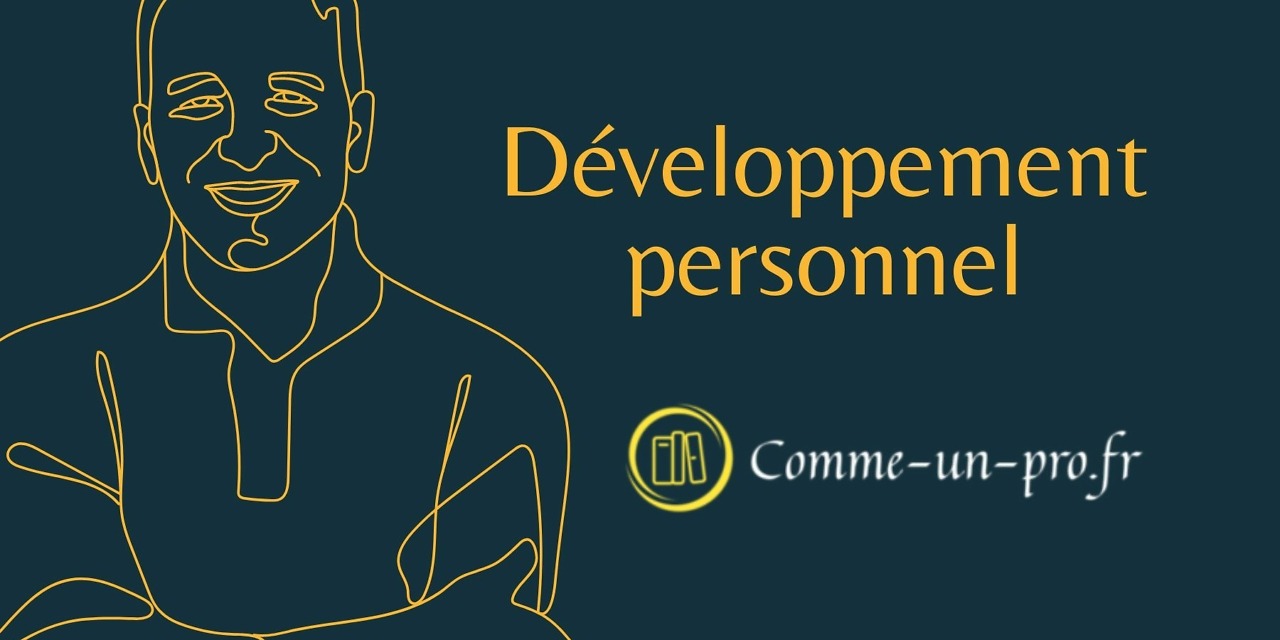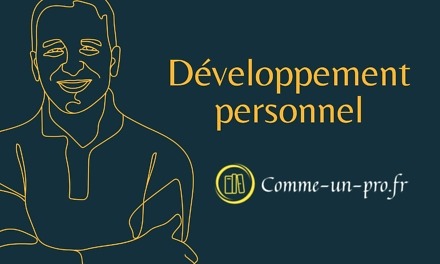Habit 1 – Be proactive: Take back control of your life
If you're looking to achieve your dreams and achieve success in life, “The 7 Habits of Highly Achievers” by Stephen R. Covey offers valuable advice. In this first part, we will discover the first habit: being proactive.
Being proactive means understanding that you are the captain of your ship. You are in charge of your life. It's not just about taking action, it's about understanding that you have responsibility for those actions. This awareness can be a real catalyst for change.
Have you ever felt at the mercy of circumstances, trapped by the vagaries of life? Covey encourages us to take a different perspective. We can choose our response to these situations. For example, when faced with a challenge, we may see it as an opportunity for growth rather than an insurmountable obstacle.
Exercise: To begin practicing this habit, think of a recent situation where you felt helpless. Now think about how you might have reacted proactively. What could you have done to positively influence the outcome? Write down these ideas and think about how you could put them into practice the next time you find yourself in a similar situation.
Remember, change starts with small steps. Every day, look for opportunities to be proactive. Over time, this habit will sink in and you will begin to see positive changes in your life.
Don't just observe your life from the sidelines. Take control, be proactive and start making your dreams come true today.
Habit 2 – Start with the end in mind: Define your vision
Let's continue our journey into the world of “7 Habits of Highly Effective People”. The second habit that Covey mentions is that of “starting with the end in mind”. It's a habit that requires clarity, vision and determination.
What is the destination of your life? What vision do you have for your future? If you don't know where you are going, how will you know you got there? Starting with the end in mind means clearly defining what you want to achieve. It is also understanding that every action you take today brings you closer to or further from this vision.
Visualize your success. What are your dearest dreams? What do you want to achieve in your personal life, in your career or in your community? By having a clear vision of what you want to achieve, you can align your daily actions with that vision.
Exercise: Take a moment to reflect on your vision. What do you want to achieve in life? What are the values that are dear to you? Write a personal mission statement that summarizes your vision and values. Refer to this statement every day to help you stay focused and aligned.
It's important to note that "starting with the end in mind" doesn't mean you have to have all the details of your journey mapped out. Rather, it's about understanding your desired destination and making decisions aligned with that vision.
Ask yourself: is every action you take today getting you closer to your vision? If not, what steps can you take to refocus and get closer to your goal?
Being proactive and starting with the end in mind are two powerful habits that can help you take control of your life and achieve your dreams. So what is your vision?
Habit 3 – Putting First Things First: Prioritizing for Success
We now explore the third habit detailed in “The 7 Habits of Highly Effective People” by Stephen R. Covey, which is “Putting First Things First”. This habit focuses on managing your time and resources effectively.
Being proactive and having a clear vision of your destination are two important steps to achieving your dreams. However, without effective planning and organization, it is easy to get sidetracked or lost.
“Putting first things first” means prioritizing activities that bring you closer to your vision. It's about distinguishing between what's important and what's not, and focusing your time and energy on activities that are truly meaningful and contribute to your long-term goals.
Exercise: Think about your daily activities. What tasks bring you closer to your vision? These are your important activities. What tasks distract you or add no real value to your life? These are your less important activities. Try to reduce or eliminate these and focus more on the important tasks.
Remember, it's not about doing more, it's about doing what matters. By putting the first things first, you can ensure that your efforts are focused on what really matters.
It's time to take control, set your priorities and take a step closer to realizing your dreams. So what are the first things for you?
Habit 4 – Think win-win: Adopt an abundance mentality
We come to the fourth habit in our exploration of the book “The 7 Habits of Highly Effective People” by Stephen R. Covey. This habit is that of “Thinking win-win”. This habit revolves around the idea of adopting an abundance mentality and seeking mutually beneficial solutions.
Covey suggests that we should always look for solutions that benefit all parties involved, not just seek to get the most for ourselves. This requires an abundance mentality, where we believe there is enough success and resources for everyone.
Thinking win-win means understanding that your success should not come at the expense of others. On the contrary, you can work with others to create a win-win situation.
Exercise: Think of a recent situation where you had a disagreement or conflict. How could you have approached it with a win-win mentality? How could you have sought a solution that would benefit all parties involved?
Thinking win-win means not only striving for your own success, but also helping others succeed. It is about building positive and lasting relationships based on mutual respect and mutual benefit.
Adopting a win-win mentality can not only help you achieve your own goals, but also create a more positive and cooperative environment. So how can you start thinking win-win today?
Habit 5 – Seek first to understand, then to be understood: The art of empathetic communication
The next habit we explore from “The 7 Habits of Highly Effective People” by Stephen R. Covey is “Seek first to understand, then to be understood”. This habit is centered on communication and empathetic listening.
Empathetic listening is the act of listening with the intention of truly understanding the feelings and perspectives of others, without being judgmental. It's a valuable skill that can greatly improve the quality of your personal and professional relationships.
Seeking to understand first means putting aside your own thoughts and feelings to truly understand others. It takes patience, open-mindedness and empathy.
Exercise: Think of a recent conversation you had. Did you really listen to the other person, or were you too focused on what you were going to say next? Try practicing empathetic listening in your next conversation.
Then seeking to be understood means communicating your own feelings and perspectives in a respectful and clear way. It is recognizing that your point of view is just as valid and deserves to be heard.
Seeking first to understand, then to be understood is a powerful approach to communication that can transform your relationships and help you succeed in all areas of your life. Ready to bring new depth to your interactions?
Habit 6 – Synergizing: Joining Forces for Success
By addressing the sixth habit of the book “The 7 Habits of Highly Effective People” by Stephen R. Covey, we explore the concept of synergy. Synergy means working together to achieve things that no individual could achieve alone.
Synergy stems from the idea that the whole is greater than the sum of its parts. In other words, when we join forces and combine our unique talents and skills, we are able to accomplish so much more than if we were working on our own.
Joining forces for success doesn't just mean collaborating on projects or tasks. It also means validating and celebrating each other's differences and using those differences as a strength.
Exercise: Think of a recent time when you worked as a team. How did the collaboration improve the end result? How can you apply the concept of synergy to other aspects of your life?
Achieving synergy is not always easy. It requires respect, openness and communication. But when we manage to create a real synergy, we discover a new level of creativity and productivity. So, are you ready to join forces for success?
Habit 7 – Sharpening the Saw: The Importance of Continuous Improvement
The seventh and final habit in Stephen R. Covey's “The 7 Habits of Highly Effective People” is “Sharpening the Saw”. This habit emphasizes the importance of continuous improvement in all aspects of our lives.
The idea behind “sharpening the saw” is that it is essential to constantly maintain and improve our greatest asset: ourselves. It involves caring for our bodies through exercise and healthy eating, our minds through lifelong learning, our souls through meaningful activities, and our relationships through empathetic communication.
Sharpening the saw is not a one-time job, but rather a lifelong habit. It is a discipline that requires a commitment to self-improvement and self-renewal.
Exercise: Do an honest self-examination of your life. What areas would you like to improve? Create an action plan to “sharpen your saw” in these areas.
Stephen R. Covey points out that when we incorporate these seven habits into our lives, we can achieve success in all areas of our lives, whether it's our careers, our relationships, or our personal well-being. So, are you ready to sharpen your saw?
Extend your trip with the video of the book
To help you anchor these precious habits even more in your life, I invite you to watch a video of the book “The 7 Habits of those who achieve everything they undertake”. It's a great opportunity to hear and understand the concepts directly from the author, Stephen R. Covey.
However, remember that no video can replace the full book reading experience. If you found this exploration of the 7 Habits helpful and inspiring, I highly recommend picking up the book, whether at a bookstore, online, or at a local library. Let this video be the start of your journey into the universe of the 7 Habits and use the book to deepen your understanding.
So, ready to do whatever you set out to do? The first step is right here, just a click away. Happy viewing and happy reading!


